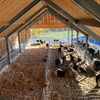Jackson Lab discovery may lead to new ways to treat brain diseases
Researchers at Jackson Laboratory in Bar Harbor and their collaborators said they have found that the buildup of certain molecules in the brain may lead to diseases such as Alzheimer’s disease, Parkinson’s disease and Lewy body dementia.
Their finding, published in the Proceedings of the National Academy of Sciences, shows that a buildup of the basic building blocks of lipid molecules called “sphingolipids” could be linked to epilepsy, dementia and other neurodegenerative diseases, according to the researchers, who add that understanding how sphingolipids work may lead to new approaches to treating those diseases.
The sphingolipids are made of building block molecules known as long-chain base substrates, or LCBs. If those LCBs are damaged, they, in turn, can cause sphingolipids malformation. Damaged LCBs also create excess amounts of themselves.
In the published paper, lead researcher Lihong Zhao, an associate research scientist at Jackson Labs, showed that the buildup of LCBs causes neurodegeneration. So far, studies have been confined to mice, but the researchers say similar buildups occur in humans and cause epilepsy and dementia.
Shao said in a statement that the results “suggest that addressing LCB accumulation could be a new therapeutic approach for neurodegenerative diseases.”
Read more
Jackson Lab to ramp up Lowe's conversion
Jackson Lab plots timetable for $125M Ellsworth expansion
USDA awards Jackson Labs $5.8M for research
Bowdoin vice president departs for Jackson Lab position
Jackson Lab gets $1.3M teaching grant for Maine, Connecticut program
Jackson Lab method may preserve fertility in female cancer patients
Jackson Lab gets $3.4M purse for genetic disorder research
Jackson Lab spinoff grabs $2M for cancer treatment research
Jackson Lab groundbreaking heralds expanded space, more jobs














Comments